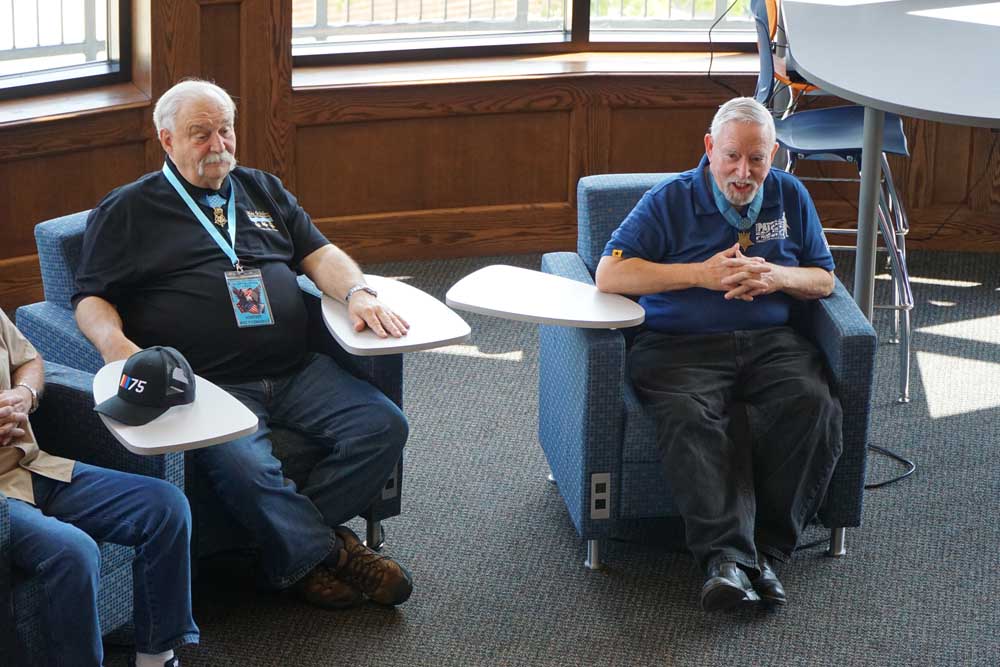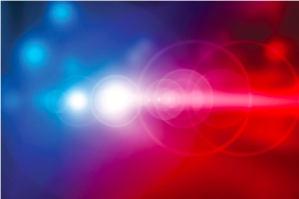‘My final duty’: Medal of Honor recipient finds resting places for unclaimed vets’ remains
Published 5:45 am Wednesday, September 27, 2023

- Medal of Honor recipients Michael Fitzmaurice, left, and Don Ballard, right, speak to Brook Hill High School students on Sept. 22. Fitzmaurice, Ballard and Bob Patterson are three Medal of Honor recipients who were honored during the Texas Veterans Military Show in Bullard.
Editor’s note: This is the first in a three-part series featuring honorees at the Sept. 23 Texas Veterans Military Show in Bullard.
As a U.S. Navy hospital corpsman, Donald “Doc” Ballard had one focus: saving the lives of wounded troops. Now, he’s more concerned about what happens to veterans after they die.
Trending
“I was so bad at keeping people alive I became a funeral director,” Ballard joked while talking to a group of students Sept. 22 at Brook Hill School in Bullard.
Ballard’s sense of humor is about as close to his heart as the blue ribbon and bronze star that hang around his neck.
He had a career in standup comedy, he said, “until they told me to sit down.”
Like a bandage, laughter covers his battle scars. Ballard, 77, served in the Vietnam War, and he earned the Medal of Honor for saving the lives of wounded service members — nearly at the expense of his own.
Now, his mission is to find final resting places for the unclaimed remains of the nation’s vets.
“I’m all about paying it forward and giving it back,” Ballard said. “That’s all I’ve got left. I’m close to 80 years old. If veterans don’t take care of veterans, who’s going to? That’s my theory.”
Trending
Among the honored
It was a patriotic celebration that recently brought Ballard to Bullard in Smith County. Of the nation’s 65 living Medal of Honor recipients, three — Ballard, Michael Fitzmaurice and Bob Patterson — were honorees at the Texas Veterans Military Show.
“All my family had served since the Second World War, and they impressed upon me that you’re not going to live in this country for free,” Ballard told the group of Brook Hill students. “You need to pay something to have your freedom, pay something for the quality of life that we have today. So, I had a second motivation of joining the military, and that was to pay it back.”
It was his first motivation, however, that determined his destiny.
Ballard, who is from Kansas City, Missouri, was a full-time student in dental school when his dentist, an Army reservist, suggested he join the military to get his education paid for. Ballard enlisted in the Navy in 1965.
“I didn’t sign up to go to the war,” he said. “I just signed up to get college tuition. I knew the Navy would give me a job after I got out of college because I was required to serve time back so I’d have a paycheck.”
‘Corpsman up!’
Ballard became a corpsman, who serve as medics. In times of war, Navy hospital corpsmen are assigned to serve with Marine units. On May 16, 1968, Ballard — a corpsman second class at the time — found himself with Company M, 3rd Battalion of the 4th Marines, 3{span style=”font-size: 10px;”}rd{/span} Marine Division during the Tet Offensive.
Company M was heading toward the Quang Tri province in north-central Vietnam, according to Ballard’s official Medal of Honor citation. He treated two men who were overheated and took them to a helicopter evacuation zone. As he returned to his platoon, North Vietnamese Army soldiers attacked his company.
“We’re moving in a formation of some kind,” Ballard said. “We’re spread out so that not one round would kill all of us. We heard the crack of a rifle, and then the next thing was the Marine Corps battle cry, ‘Corpsman up!’ Corpsman up! Doc, we need you up here. Somebody’s shot.’ ”
Ballard that day pulled wounded troops into a bomb crater, which provided some protection from enemy fire.
Ballard picked up a soldier and carried him back to the crater, but he didn’t know that an enemy grenade had been tossed in. When he laid the wounded soldier down, the grenade detonated, blowing the soldier’s legs off above the knee.
“Now I’ve got a whole new set of problems working on him,” Ballard said. “But it also tore off the face of the guy laying on the ground behind him.”
As Ballard worked to stop the men’s bleeding, a grenade hit his helmet. He grabbed the grenade and “flung it out of the gosh dang crater,” he said.
Ballard kept working on the man without legs when another soldier yelled, “Doc!” Ballard looked to the ground and saw yet another grenade.
“I figured all of the people are going to die in that hole, including myself,” he said. “So, I lunged for it, and I grabbed it, and I pulled it up under my chest. I was wearing a bullet-proof vest.
“I’m laying there, and if you have an epiphany, and if you ever talked to God before, listen to Him, because He told me how stupid I was and I better get rid of it. ‘Boy, you’re not too smart.’ So, I rolled up on top of the patient that had his legs blown off, and I threw it in the air — flung it out of the bomb crater. And it went off in mid-air. So, nobody got hurt from it.”
That was the day for which Ballard would earn the Medal of Honor. Of the more than 41 million Americans who’ve served in the U.S. military, only 3,517 have earned that honor, according to the National Medal of Honor Museum.
As he spoke to Brook Hill students about that nearly fateful day, he cracked a few jokes and made his recounting of the story a little lighter — right down to the grenade he threw himself upon.
“I jumped on a hand grenade that was made in China,” Ballard said. “Luckily, they bought it at the dollar store. It didn’t go off. Cheap stuff.”
Ballard’s active-duty Navy service ended in 1970, the same year he was called to the White House. On May 14, President Richard Nixon presented Ballard with the medal.
“I got the Medal of Honor without knowing what I got the medal for,” Ballard said. “I didn’t learn until I got to the White House what I had done. I had risked my life so many times, and I’d done so many foolish things and killed six Vietnamese soldiers, I thought, ‘Why am I going here?’ I didn’t know what they were putting me in for.”
Outside the walls of the White House, however, veterans like Ballard weren’t warmly received. Anti-war protesters, many of whom were radicalized college students, attacked veterans across the nation. People threw dog feces and cups of urine on troops, Ballard said.
“First of all, we fought the enemy,” he said. “Then we came home and had to fight the public.”
‘Give them a home’
Ballard joined the Kansas Army National Guard after his Navy service ended, and he eventually attained the rank of colonel.
He never became a dentist. Instead, he worked as a paramedic in Kansas City.
One encounter with a patient gave him a new purpose.
That patient was a veteran who wanted a funeral and burial when he died. But because the veteran didn’t have the money for it, he was cremated. Ballard said he and some friends wanted to do something more to honor veterans at the end of their lives.
“We needed to find a funeral home that would work with us,” Ballard said. “One of the men … said, ‘Doc, what’s it take to be a funeral director?’ I said, ‘I spent 30 years trying to keep them alive. I don’t know about funerals. But I’ll find out.’ ”
He did, and he became a funeral director in less than a year. He owns Chapel of Memories Funeral Home and Funeral Services of Independence near Kansas City, where he guides veterans and their families through funeral pre-planning.
His main mission, however, is to identify the unclaimed remains of veterans and give them proper military funerals and burials.
A 2018 report from the Department of Veterans Affairs Inspector General’s Office estimated that the remains of as many as 52,600 veterans may not have been identified and buried. Veterans whose remains are unaccounted for may have been homeless and found dead without identifying documentation, or family members may not have stepped forward to claim their remains.
“They may be sitting on the shelves in these funeral homes,” Ballard said. “What I’ve done is identified them, and we’re taking action to collect their ashes up and give them a home, give them the honors like the salutes and the military flags and military honors that they deserve.”
Ballard is raising funds through his funeral home to continue that work.
In the future, veterans’ remains could be housed in a columbarium across from Indianapolis Motor Speedway. Ballard’s Unclaimed Heroes Project is raising funds to build the columbarium and a new building for American Legion Speedway Post 500. It’ll be named the Colonel “Doc” Ballard Medal of Honor Center.
One source of fundraising is the sale of customized bricks. People can pay to have the name of a veteran engraved on a brick, and it will be used in a walkway at the facility. The name of the fundraising effort is called “Kiss A Brick,” a tribute to the tradition of winning racers kissing bricks on the track at the adjacent speedway.
Ballard is also seeking sponsorships from businesses and other entities. Those who want to learn more about sponsoring the project or purchasing bricks can visit www.kissabrick.com/.
Identifying and burying veterans’ remains, Ballard said, is a way of honoring those who served.
“That’s my final duty,” he said. “That’s my legacy.”
‘I risked my life’
As a Medal of Honor recipient, Ballard speaks at events across the nation. He’s involved with several nonprofit organizations supporting veterans, too.
That work is an extension of his life of service, which began on a battlefield.
“I just did my job, mostly. I got wounded eight times myself. Nowhere on here does it say you have to be smart,” he said, referring to the medal. “It says you have to be brave and care and love, but you don’t have to be smart. So, I risked my life.”
As Brook Hill School students listened to Ballard, an educator asked him to describe the actions that led him to get the Medal of Honor.
“I bought it at Walmart,” Ballard replied, eliciting laughter from the crowd.
“I have to laugh at what I did because I’d be crying if I didn’t laugh,” he said. “I treat life with humor because that’s the best way to get through the emotions sometimes, you know?”





